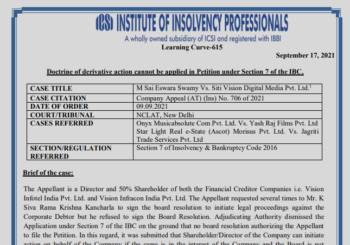Study Notes - Regulatory Framework Buyback of Shares
June 19, 2020
The legal framework that regulates the buy-back of shares and other specified securities are the following:
- Companies Act, 2013
- Companies (Shares Capital & Debenture) Rules 2014; and
- SEBI (Buy-back of Securities Amendment) Regulations, 2013 as well as subsequent amendments thereafter
| Class of Companies | Regulation |
|---|---|
| Buy-Back of Unlisted Public Company & Private Limited Company | Section 68, 69, 70 of Companies Act, 2013 Rule 17 of Companies (Share Capital & Debentures) Rule, 2014 |
| Buy-Back for Listed Companies | Section 68, 69, 70 of Companies Act, 2013 Rule 17 of Companies (Share Capital & Debentures) Rule, 2014 Securities Exchange Board of India (Buy-Back of Securities Amendment) Regulations, 2013 |
Modes of Buyback of Shares
The shares can be bought back through any of the following:
- The existing shareholders on the proportionate basis;
- The Open Market; and
- Buying shares from the employee under the Scheme of Sweat Equity or Employee Stock Option
Conditions & Requirements for Buyback of Shares and Other Securities
According to new SEBI (Buy-back of Securities) Regulations, 2018, the applicant requires fulfilling the following conditions for buyback of shares and other specified securities:
- The maximum limit of buy-back of shares/securities shall be 25% or less of the total paid-up capital and free reserves of the company
Note:The reference to 25% in this regulation, in respect of the buyback of shares/securities in any of the financial year, implies its total paid-up equity capital in that FY.
- The ratio of the total secures and unsecured debts that the company owes after buyback shouldn’t be more than twice the paid-up capital and free reserves
Condition: The Central Government may, by order, notify a higher ratio of the debt to capital and free reserves for a class or classes of companies.
- All shares and other securities for buy-back should be wholly paid-up
- ompanies may buy back their shares or other securities by any of the following means:
- The existing shares other specified security-holders on the basis of proportion through the tender offer;
- Open market through-
- Book-building process
- Stock Exchange
- Odd-lot holder
- A company could undertake a buy-back of its own shares or securities out of the following:
- Its free reserves,
- The securities premium account, or
- The proceeds of the issue of any shares or securities as specified:
Condition: Any such buy-back shall not be made out of the proceeds of an earlier issue of the similar shares or other specified securities.
Note: For this regulation, “free reserves” comprises a securities premium account.
Restrictions on Buyback
Along with the above-described conditions, there are some restrictions on the companies opting for buy-back of shares. These are also a kind of condition that the applicant company must follow. They are as follows:
- A company can’t buy-back its shares or other specified securities from any individual via negotiated deals, whether on or off the stock exchange or through any private arrangement or through spot transactions
- Companies cannot buy-back their shares or other specified securities from the stock exchange for the purpose of delisting their shares or other specified securities
- Companies can’t offer any buy-back within a period of one year reckoned from the expiry date of the buyback period of the preceding offer of the buyback if any
- The company can’t let buyback of its shares unless the consequent reduction of its share capital is affected
- A company can’t purchase its own shares or other specified securities either directly or indirectly
- Through any subsidiary company consisting of its own subsidiary companies;
- Via any investment company or group of investment companies; or
- In case the company has made a default in the repayment of the deposits accepted either before or after the commencement of the Companies Act, interest payment thereon, redemption of debentures or preference shares or payment of dividend to any shareholder, or repayment of any term loan or interest payable thereon to any financial institution or banking company
Condition: The buyback isn’t restricted, in case the company has resolved its default and it has lapsed a period of three years after such default.
Procedure for Buyback of Shares India
Now that you are aware of the conditions and if you meet the requirements, then you can go for the process for buyback of shares in India:
- Step 1: Convene the Board Meeting Firstly, the applicant needs to call a board meeting. For the same, a notice must be sent to the directors of the company at least 7 days prior to the date of the meeting
- Step 2: Approval for EGM
In the board meeting, the applicant company needs to approve the buy-back, fix the date of the EGM (Extra-Ordinary Meeting), and approve the EGM’s notice along with the explanatory statement under Section 102 - Step 3: Send the notice for EGM Once the notice for EGM is approved, the applicant must send it at least 21 days before the date of the meeting
- Step 4: Passing of Special Resolution for Buy-Back of Shares
In the EGM, a special resolution must be passed for the approval of the Buy-back of shares - Step 5: File SH-8 After the resolution has been passed, one must file the Letter of Offer in Form SH-8 with the Registrar. Furthermore, the form must contain the signature of two directors of the company
- Step 6: Declaration of Solvency Along with the form SH-8, you need to annex form SH-9 which is the declaration of solvency. Again, the form must be signed by the two directors of the directors.
- Step 7: Letter of Offer to the Shareholders Within 20 days of the filing of SH-8 with the Registrar, the applicant needs to dispatch the ‘Letter of Offer’ to the shareholders of the company. Moreover, the Letter of Offer needs to be kept open for at least 15 days and a maximum of 30 days.
- Step 8: Acceptance of Offer The Offer will be considered as accepted if there’s no communication of rejection within 21 days of offer closure
- Step 9: Opening of a Bank Account So, if the shareholders have accepted the offer, the applicant company has to open a separate bank account. Besides, the total consideration amount for the shares offered to be paid in Buy-back should be deposited in a separate bank account.
Furthermore, the consideration must be paid within seven days of verification. Moreover, shares that are to be bought back should be destroyed within seven days of the completion of buyback. - Step 10: Filing of SH-11 Lastly, the applicant needs to file form SH-11 within thirty days of the completion of the buyback return.
What are the provisions of the Buyback of Shares under Section 68?
In any case, the company is found to make any default in the process under Section 68 of the Companies Act, 2013, or any listed company of any regulation made by SEBI, then-
- Such a company would be subject to a fine of not less than ₹1 lakh. In fact, it would exceed up to ₹3 lakhs
- Every such officer engaged in the process who is in default shall be punishable for a period that could extend up to three years or fine with an amount not less than ₹1 lakh.
Disclaimer
All academic material provided in this website by way of quiz or otherwise is derived from various sources, reference of which is given below. The objective is to provide such information or exercises is purely for academic purpose. MPPL is not the creator of such information since they are derived from the statutes, laws, rules, regulations, notifications or circulars issued by the government authorities or judgments of courts of law under relevant laws. While MPPL is only collating such information, it does not claim any exclusive copyright thereon except the manner in which it is being presented. The user understands that some situational questions can have different views and opinions which may not necessarily match with what the answer keys provide. MPPL does not vouch for or guarantee the accuracy or dependability of the answer key. Nor shall it be liable for any suits, prosecution, proceedings, actions, damages based on the academic information provided here. The responsibility to cross-check and verify the veracity of the information provided here rests upon the user and visitor of the website.
MPPL has taken all reasonable precautions for not violating anyone else’s copyright or intellectual property right and believes. However, in case someone still feels that any of the content provided here was subject to their copyright, such person is requested to get in touch with MPPL on its email id a pratima@mangalamjobs.com and necessary remedial measures can be undertaken without prejudice to MPPL.


